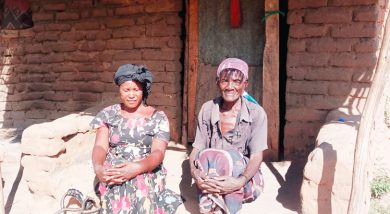Kicking out malaria
The onset was slow and ignored. Not a day later. Weary from garden, little Anjilu’s mother found him weak and her sweaty frame in bad condition. High fever, vomiting and shivering had taken their toll on the baby hit hard by malaria.
Unconscious, little Anjilu was referred from Mdeka Health Centre to Queen Elizabeth Central Hospital (Qech) in Blantyre.
The young patient from distant Mwendayenda Village, Traditional Authority Chigalu in Blantyre, is not an isolated case.

Malawi registers over five million malaria episodes every year.
The disease that spreads through mosquito bites is a leading cause of illness and death in under-five children.
Malawi is one of the countries worst affected by malaria, with over 4 million cases and 7000 deaths in 2017. Local doctors and nurses hope that a vaccine on trial in 11 districts, along with other malaria prevention measures, will reduce the number of life-threatening infections due to the disease.
Anjilu was lucky to be on the safe side of these statistics.
“Health workers say he will be discharged soon,” stated Anjilu Mariam Mchenga, a grandmother to the child, as medical staff attended to the baby in the referral hospital’s ward for children taken ill by malaria.
Malaria remains one of the world’s leading killers, claiming the life of one child every two minutes.
Most of these deaths are in Africa, where more than 250 000 children die from the disease every year. Children under 5 are at greatest risk of its life-threatening complications. Worldwide, malaria kills 435 000 people a year, most of them children.
“For those that survive, there is a risk of lifelong challenges like learning difficulties,” points out Dr. Karl Seydel, a malaria consultant at Qech.
Since 2000, the global caseload has dropped by 60 percent. However, this must not mask important realities.
Declines in funding and proliferation of counterfeit drugs threaten to give way to the resurgence of the disease prevented by sleeping under insecticide treated bed nets, the country’s main weapon against mosquito bites.
In 2018, only $2.7 billion was committed, down from almost $3.1 billion in 2017.
The drop comes at a time the world requires no less than $5 billion to beat the disease, according to World Health Organisation (WHO).
Last year, a global malaria report released by the United Nation (UN) health agency noted strides in the last four years have stalled.
In 2018, malaria infected 228 million people, killing about 400 000.
The problem runs deep in sub-Saharan nations, including Malawi, slowing the pace to achieve Sustainable Development Goal three (SDG3) to end the disease by 2030.
Can Africa end malaria?
Algeria is the latest malaria-free zone in the WHO Africa region after Mauritius.
Algerians have stopped homegrown transmissions for three consecutive years.
Dr Matshindo Moeti, WHO director for the Africa Region, says an enduring regional crusade is needed to end malaria in the next decade.
“Diseases do not respect boundaries. It is vital that we do more to share information, expertise and resources, and to improve coordination of interventions…” he said at the 2019 Southern Africa Development Community (Sadc) health ministers’ meeting in Tanzania.
Counting costs.
Malawi’s workforce loses up to 25 days a year due to malaria.
Its impact is crippling to families just as it is to Africa’s economy.
The World Bank reports that the disease robs the continent of $12 billion annually, only $2 billion shy of the record $14 billion Global Fund’s renewed commitment to globally end tuberculosis, Aids and malaria.
But all is not doom and gloom.
After 32 years of research, the world’s first vaccine to provide partial protection against malaria in children is here.
The vaccine trial spearheaded by WHO targeted 360 000 children every year in selected sites across Malawi, Kenya and Ghana. Malawi was the first country to pilot the vaccine in its routine immunisation programme across 11 districts.
According to WHO, the vaccine is clinically proven to reduce the risk of catching malaria by 40 percent.
“Preventing 4 in every 10 cases implies huge impact,” observes Dr. Donnie Matengula, a Blantyre-based epidemiologist with the Malawi Liverpool Wellcome Trust, a clinical research body of international repute.
“It complements current efforts such as use of insecticide treated bed nets,” he says. “It is possible to eradicate malaria as was the case with smallpox, polio and measles. The next step demands aggressive innovations, including the possible use of genetically modified mosquitoes.”
More innovations
In Burkina Faso, thousands of genetically sterilised mosquitoes have been released to depopulate their malaria-carrying counterparts.
Scientists are also exploring the use of dogs to locate malaria in symptomless individuals to ensure diagnosis does not delay treatment.
“They are much faster than existing rapid diagnostic tests which take up to 20 minutes and require a fully trained professional to do,” Chelci Squires, from the London School of Hygiene and Tropical Medicine, told BBC.
The broadening array of fresh innovations brightens the prospects of ending malaria by 2030, with the maiden vaccine trials coming to an end in 2022.
Until then, many children like Anjilu bank their hopes on current tools to wipe malaria that now kills a child every two minutes, according to WHO.





